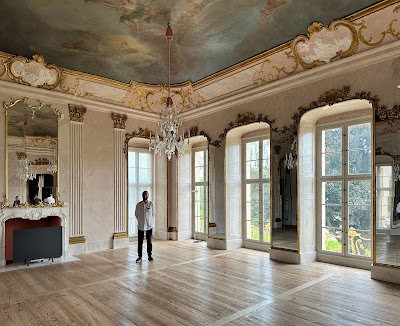
|
| Rheinsberg Castle |

|
|
The Vossische Zeitung published Kurt's preferences in their New Year's edition, 1928 |

|
| Crown Prince Frederick at the entrance to Rheisberg |

|
| Click to enlarge |
Our travel group experienced all. Following a tour of the rooms at Rheinsberg Castle, our guide took us on an excursion through the parks.
After a visit to the Tucholsky Museum, a boat trip through the extensive chain of Brandenburg lakes to the north across the border to Mecklenburg-Vorpommern concluded the last day of Red Baron's trip to Havelland.

|
| Our specialized tour guide is already waiting for us. |

|
| Prince Frederick William Henry Augustus of Prussia |
While the king was a dud in terms of population policy, his cousin
Frederick William Henry Augustus, with 11 illegitimate children, was the exact opposite.
He probably strove to emulate his uncle, the
Soldier King, who fathered 14 legitimate children with his wife, Sophie Dorothea.
Wikipedia knows, "Frederick William Henry Augustus' first mistress, Karoline Friederike Wichmann, with whom he cohabited from 1805 until 1817, bore him four children. She was ennobled as Baroness von Waldenburg."

|
| Baroness von Prillwitz |
Before we took off for our walk in the park, our guide showed us a grotto within the castle. The artificial cave later served as a laundry. As a result, the romantic wall paintings are mostly destroyed.

|
| View into the main avenue in the direction of the garden portal. |

|
| View from the hedge parterre in the direction of Lake Grienerick. |

|
| Locked entrance to the Egeria Grotto. |

|
| View from the park toward the obelisk. |
Prince Augustus William of Prussia was the eleventh child of the Soldier King and his wife Sophie Dorothea, and Frederick the Great's younger brother. He served in the army alongside the entire family. It happened that his first own command was the unfortunate retreat of Prussian troops after the Battle of Kolín. The bombardment of Zittau by Austrian troops led his brother, the king, to rush to his aid with his army from Silesia. After the two armies were united at Bautzen, Frederick immediately reprimanded his brother sharply and ungraciously dismissed him from troop service. Less than a year later, Prince August Wilhelm died, broken in body and soul, presumably from a brain tumor.
Another brother of King Frederick,
Prince Henry of Prussia, the 13th and the one but last child of the Soldier King and Queen Sophia
Dorothea, successfully led Prussian armies in the Silesian Wars and the
Seven Years' War. He lived in Rheinsberg Palace after receiving it as a gift
from his brother-king in 1744.
Still, Henry could not bear Frederick's atrocity against August Wilhelm. So he had a memorial column erected for his humiliated brother bearing the Latin inscription: HINC VENVSTVM OS VIRI VERITATIS VIRTVTIS PATRIAE AMANTISSIMI. Fontane translated it into: Here is the friendly face of the favorite of truth, virtue, and of the fatherland.
It is not finished yet with Prince Henry for Red Baron read in
Wikipedia, "In 1786, either
Nathaniel Gorham, then-President of the Continental Congress, or
Friedrich Wilhelm von Steuben, the Prussian general who served in the Continental Army, suggested to
Alexander Hamilton
that Henry should become monarch of the United States, but the prince
declined, and the new nation had no support for a monarchy."

|
| Our guide reads the pyramid's inscription in German |
Thrown from his birth into this vortex of adulation,
which the vulgar calls glory and greatness,
But in which the wise man recognizes nothingness;
a victim of all the evils of humanity;
tormented by the passions of others,
agitated by his own;
Often confronted with slander or a victim of injustice;
still burdened by the loss of cherished parents, trusted and loyal friends,
but also often comforted by friendship;
happy in the recollection of his thoughts,
and happier still when his services have been of benefit to his homeland
or for a suffering humanity.
This is the short version of the life
of Frederick Henry Ludwig
son of Frederick William I, King of Prussia,
and Sophie Dorothea, daughter of George I, King of Great Britain.
*


No comments:
Post a Comment